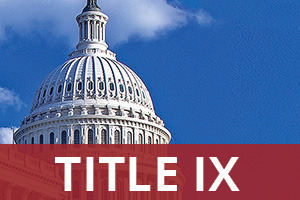ED Releases Final Title IX Rule
 On April 19, the Department of Education (ED) released the text of the highly anticipated Title IX final rule. The final rule expands protections against sex-based discrimination to cover sexual orientation, gender identity, and pregnancy or related conditions. The rule also revokes both the Trump administration’s ban on campuses using a single person to investigate and adjudicate Title IX complaints and the Trump mandate regarding cross-examination of complainants. Institutions will need to be in compliance with the final rule by August 1, 2024.
On April 19, the Department of Education (ED) released the text of the highly anticipated Title IX final rule. The final rule expands protections against sex-based discrimination to cover sexual orientation, gender identity, and pregnancy or related conditions. The rule also revokes both the Trump administration’s ban on campuses using a single person to investigate and adjudicate Title IX complaints and the Trump mandate regarding cross-examination of complainants. Institutions will need to be in compliance with the final rule by August 1, 2024.
Background
The ED released the text of the proposed rule on June 23, 2022, though the Federal Register did not officially publish the proposal until several weeks later on July 12, 2022. The agency received over 240,000 comments in response, including CUPA-HR comments seeking clarification on the overlaps between the ED’s proposal with institutions’ existing obligations to address employment discrimination. CUPA-HR also joined comments led by the American Council on Education.
Noteworthy Provisions of the Final Rule
As discussed above, the final rule defines “sex-based harassment” as a form of sex discrimination that includes sexual harassment and harassment based on sex stereotypes, sex characteristics, sexual orientation, gender identity, or pregnancy or related conditions. The term “pregnancy or related conditions” is further defined in the final rule to include pregnancy, childbirth, termination of pregnancy, lactation, and all related medical conditions and recovery.
Additionally, as first introduced in the proposed rule, the final rule establishes new grievance procedures for sex-based harassment complaints. Specifically, the final rule requires institutions to apply two separate grievance procedures for sex-based harassment complaints depending on whether or not students are involved. The first section (§106.45) applies to any complaint of sex discrimination on campus, including employee-to-employee sex-based harassment complaints. The second section (§ 106.46) only applies when a student is involved as either the complainant or respondent (or both), regardless of whether the matter also involves employees. Notably, the second set of procedures also applies where a student is also an employee. The new rules also allow for certain complaints to move through an informal resolution process separate from the grievance procedures listed above if both parties agree to choose to move forward with that process.
The final rule also imposes several training requirements, which the ED also included in the proposed rule. Under the rule, institutions must train all employees on the institution’s obligation to address sex discrimination under Title IX, the scope of conduct that constitutes sex discrimination under the law, and the notification and information requirements that applicable employees must follow upon learning about instances of sex-based harassment. Additionally, institutions must train individuals who serve as investigators, decisionmakers, and others responsible for implementing an institution’s grievance procedures on the institution’s grievance procedures and how to serve impartially through the grievance procedures. Facilitators of the informal resolution process must be trained on the rules and practices of an institution’s informal resolution process, and the institution must train individuals serving as Title IX coordinators on the requirements of their specific responsibilities throughout the notification, information, and grievance procedure processes as required by Title IX.
Finally, the rule clarifies that when responding to retaliation, institutions must undergo all procedures for notifying and informing involved parties of their obligations under Title IX and initiate the appropriate grievance procedures.
Looking Forward
CUPA-HR’s government relations team is going through the 1,577-page final rule and will provide more information on the rule as needed through CUPA-HR’s blog. Additionally, CUPA-HR will host a webinar to cover the final rule on April 30. Registration is now open and is free for all to attend.


